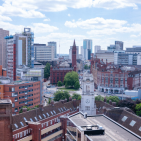Lawyers of a British Muslim terror suspect, currently detained in a Midlands prison, have urged the High Court to allow the BBC to carry out a face-to-face interview with him.
Babar Ahmad, who has been detained for more than seven years without trial, is currently held in a special detainee unit in Worcestershire.
The 38 year old denies terror-related charges and is battling extradition to the US, where the American government is adamant to have him tried on their soil.
At the High Court in London, BBC Home affairs correspondent Dominic Casciani challenged Justice Secretary Ken Clarke’s refusal to grant the media organization permission to interview Mr Ahmad.
The detainee’s lawyers supported the Mr Casciani’s arguments and stressed that the interview was vital in order to show the level of psychological and physical impact that prison life was inflicting on their client.
According to his lawyers, Mr Ahmad’s face had “prematurely aged” and is a testament to how his arrest has negatively affected him.
Lord Pannick QC, representing the BBC, told the court that permission was granted by the Ministry of Justice to the broadcaster to meet Mr Ahmad in Long Lartin prison, Worchester.
However the offer was withdrawn after the BBC said that the interview should be filmed.
Lord Pannick argued that Mr Ahmad had been detained without trial for longer than any other British national in UK history.
He also said that Mr Clarke’s refusal was a breach of the BBC’s freedom of speech under the European Convention on Human Rights and branded the decision as “disproportionate and irrational”.
He said that a filmed interview would allow the public to judge Mr Ahmad’s credibility and his views better.
However, under the rule of the Ministry of Justice, there are limitations on how journalists can meet prisoners, which the BBC failed to challenge.
Phillippa Kaufmann QC, defending Mr Ahmad, told the court that he had already made written statements, which have appeared in newspapers and other media.
But a televised interview would allow the public to see the emotional and psychological effects of his arrest in December 2003 on suspicion of being involved in terrorism-related charges, his re-arrest in August 2004 on US request and his seven year detention.
Ms Kaufmann said: “He has aged far more than the number of years that have passed since he was first detained.
”This is what written communications cannot adequately convey.”
But after a long-day hearing, two judges said that they will give their verdict in January.
Mr Ahmad is currently waiting for the European Court of Human Rights to decide whether he should be extradited or not.
He is accused by the US authorities of soliciting and raising funds over the internet for terrorism “in Afghanistan, Chechnya and other places.”
The suspect suffered injuries when he was arrested by the Metropolitan Police at his South London home in 2004.
The police admitted liability and paid him £60,000 in damages, however earlier this year, a jury found four officers not guilty of causing him bodily hard and as a result, they were cleared of misconduct.





















